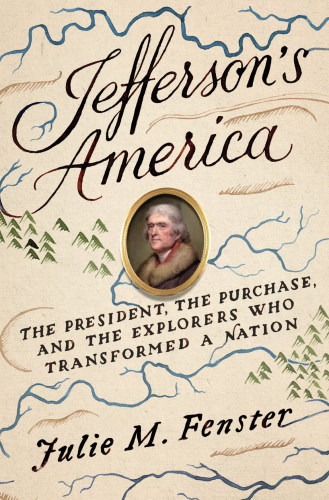
Jefferson's America
The President, the Purchase, and the Explorers Who Transformed a Nation
کتاب های مرتبط
- اطلاعات
- نقد و بررسی
- دیدگاه کاربران
نقد و بررسی

March 28, 2016
Fenster (FDR’s Shadow), a specialist in 19th-century American history, details the political strategies behind President Thomas Jefferson’s decision to dispatch teams of explorers to the vast lands west of the Mississippi River. During Jefferson’s administration, the U.S. confronted major threats from the global superpowers of that time—Britain, Spain, and France—all of whom wished to carve up the weak, newly independent nation. A major part of Jeffersonian strategy consisted of using citizen explorers—most of whom were personally recruited old friends and outlaws, including Meriwether Lewis, William Clark, George Hunter, William Dunbar, Thomas Freeman, Peter Custis, and Zebulon Pike—to take possession of the newly acquired Louisiana Territory. By avoiding the burden of deploying of a large military force to the territory, Jefferson skirted political opposition and found a means to “absorb” the West without provoking the European powers. The dangerous expeditions were plagued with disease, attacks by Native Americans, natural disasters, crew mutinies, and peril from rival nations. Fenster skillfully profiles the “Men of Jefferson” who were selected to spearhead the exploration efforts, but it’s the wily, resourceful Jefferson who steals the show with his ambitious vision, ability to gauge foreign opposition, and advantageous use of the federal treasury to support his missions. Agent: Joëlle Delbourgo, Joëlle Delbourgo Associates.

March 15, 2016
The United States purchased the Louisiana Territory for $15 million but did not know its borders. Fenster (FDR's Shadow: Louis Howe, The Force that Shaped Franklin and Eleanor Roosevelt, 2009, etc.) ably depicts the men who set out to discover them. We all know about Lewis and Clark, but there were other parties seeking the territory's boundaries. The author narrates the wonderful and twisted story of how Napoleon's France acquired the territory from Spain and then sold it a year later to America, while Spain did their best to block exploration. The threat of war with Spain was a constant, with explorers on alert. Thomas Jefferson sought men who would make a geographic record, interact and seek peace with Native Americans, and survey sites for forts. Most importantly, they were to conduct experiments to establish longitude and latitude, describe the land, and collect mineral, vegetable, and animal specimens. "Jefferson had in mind a very special combination of characteristics when he chose his explorers," writes the author. Andrew Ellicott and Thomas Freeman were appointed to survey the 31st parallel boundary between the Floridas and the Mississippi territory, working in cooperation with William Dunbar, a brilliant but difficult polymath. The self-serving Gen. James Wilkinson, a subject worth a book on his own, often got in the way and collected salary from Spain and America. In spite of Wilkinson, however, the 31st parallel project was completed. Lewis and Clark's Missouri River expedition may have been the longest, but equally important were Dunbar and chemist George Hunter's work on the Ouachita River as well as Zebulon Pike's discovery of the source of the Mississippi and his attempts to link up with Freeman's Red River expedition. Geographers and American history buffs will enjoy Fenster's detailed research on these fascinating men, her easy style of writing, and tales beyond the textbooks. She opens an entirely new vista on those who opened the West.
COPYRIGHT(2016) Kirkus Reviews, ALL RIGHTS RESERVED.

Starred review from March 15, 2016
Fenster (The Case of Abraham Lincoln) surveys Thomas Jefferson's Louisiana Purchase, following its explorers through uncharted territory. Several quests are examined: the famous Lewis and Clark journey on the Missouri River, the Pike expeditions up the Mississippi River and into the Rockies, and less-celebrated travels along the Ouachita and Red Rivers. Readers will discover the adventurers' personalities, from unrelenting Zebulon Pike to methodical Thomas Freeman. Maps detail the various routes undertaken. Remarkably, Fenster follows simultaneous treks in various regions while also retaining a coherent, pleasing, and enthralling narrative. Native American contributions include those of Sacagawea. The political and cultural relationships among many native groups are also discussed. Whereas Annette Gordon-Reed and Peter Onuf's "Most Blessed of the Patriarchs" provides an intimate portrait of Jefferson the man, Fenster's account gives us the perfect complement: Jefferson the president, the strategist, the grand visionary. The book clarifies the oft-misunderstood relationships and frontier boundaries among the United States, Britain, Napoleonic France, and Spain in early 19th-century North America. VERDICT This well-constructed work concerns a major expansion of U.S. territory, making it a necessary read for American history buffs.--Jeffrey Meyer, Mt. Pleasant P.L., IA
Copyright 2016 Library Journal, LLC Used with permission.

























دیدگاه کاربران